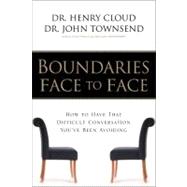
Note: Supplemental materials are not guaranteed with Rental or Used book purchases.
Purchase Benefits
What is included with this book?
| Why You Need to HaveThat Difficult Conversation | |
| The Talk Can Change Your Life | p. 15 |
| The Benefits of a Good Conversation | p. 20 |
| The Essentialsof a Good Conversation | |
| Be Emotionally Present | p. 33 |
| Be Clear about ""You"" and ""I"" | p. 36 |
| Clarify the Problem | p. 39 |
| Balance Grace and Truth | p. 42 |
| Stay on Task | p. 45 |
| Use the Formula, When You Do ""A,"" I Feel ""B"" | p. 49 |
| Affirm and Validate | p. 52 |
| Table of Contents provided by Publisher. All Rights Reserved. |
The New copy of this book will include any supplemental materials advertised. Please check the title of the book to determine if it should include any access cards, study guides, lab manuals, CDs, etc.
The Used, Rental and eBook copies of this book are not guaranteed to include any supplemental materials. Typically, only the book itself is included. This is true even if the title states it includes any access cards, study guides, lab manuals, CDs, etc.
Excerpted from Boundaries Face to Face: How to Have That Difficult Conversation You've Been Avoiding by Henry Cloud, John Townsend
All rights reserved by the original copyright owners. Excerpts are provided for display purposes only and may not be reproduced, reprinted or distributed without the written permission of the publisher.